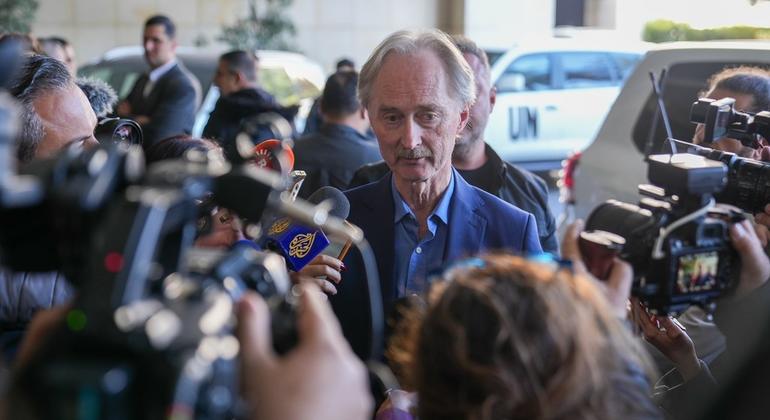The world was shocked when news broke that rebel forces, led by the Islamist group Hayat Tahrir al-Sham (HTC), had successfully overthrown President Bashar al-Assad in Syria. In the aftermath of this historic event, the Secretary-General’s Special Envoy for Syria, Geir Pedersen, arrived in the country to assess the situation and pave the way for a new political process.
Upon his arrival, Mr. Pedersen addressed the press and acknowledged the “immense” change that had taken place since the fall of the Assad regime. He emphasized the importance of getting things right from the beginning and launching a political process that includes all Syrians, led by the Syrians themselves. This marked a crucial turning point in the country’s history, with hopes for a brighter future tempered by the many challenges that lay ahead.
One of the key challenges identified by Mr. Pedersen was the need to ensure that state institutions were operational. He stressed the importance of maintaining service delivery, public order, and security in the country, as these were essential for the well-being of the population. Additionally, he highlighted the urgent need for increased humanitarian assistance to address the humanitarian crisis in Syria and support the return of refugees who wished to come back to their homeland.
As the country grappled with the aftermath of the regime change, Mr. Pedersen also underscored the importance of economic recovery. He emphasized the need to resolve this issue quickly and called for an end to sanctions to facilitate the reconstruction of Syria. Furthermore, he stressed the importance of justice and accountability, stating that perpetrators of crimes across the country must be held accountable through a credible justice system.
The images of Syrians celebrating the fall of the Assad regime in Umayyad Square in the capital, Damascus, captured the spirit of hope and renewal that swept through the country in the wake of the regime change. The euphoria of the moment was palpable, as the people of Syria looked towards a future free from the oppression and violence that had characterized the Assad regime.
Despite the optimism and sense of possibility that pervaded the country, there was also a sober recognition of the challenges that lay ahead. The task of rebuilding a nation torn apart by years of conflict and repression was daunting, and the road to lasting peace and stability was fraught with obstacles. However, with the commitment and determination of the international community, led by Mr. Pedersen and other key stakeholders, there was a sense that a new chapter was being written in Syria’s history.
The need to end impunity and ensure justice for the victims of the Assad regime’s atrocities was a critical priority. Mr. Pedersen reiterated the importance of holding perpetrators accountable for their crimes and ensuring that justice was served through a credible and transparent legal process. This was essential not only for the victims and their families but also for the broader process of reconciliation and healing that the country needed to undergo.
In the realm of economic recovery, Mr. Pedersen emphasized the urgent need to jumpstart the economy and facilitate the reconstruction of Syria. This would require a concerted effort to lift sanctions and provide the necessary support for the country to rebuild and recover from the devastation of war. The international community’s commitment to supporting Syria in this endeavor was crucial, as was the need for responsible governance and transparency in the allocation of resources.
As the dust settled on the dramatic events that had unfolded in Syria, the focus shifted towards building a new future for the country. The challenges were immense, but so too were the opportunities for positive change and progress. With the support of the international community and the resilience of the Syrian people, there was hope that a new chapter of peace, stability, and prosperity could be written in the history of this war-torn nation.
In conclusion, the fall of the Assad regime and the arrival of Mr. Pedersen in Syria marked a pivotal moment in the country’s history. The road ahead was fraught with challenges, but also filled with possibilities for a brighter future. As the country embarked on a new chapter of rebuilding and reconciliation, the international community stood ready to support Syria in its journey towards peace, stability, and prosperity.









